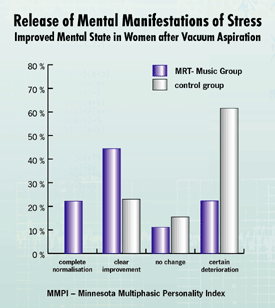Due to the enormous mental stress the psycho-emotional profile of many women often documents nearly psychopathic states. In such a state an effective release of stress and a psycho-emotional harmonization is helpful. By the help of the Minnesota Multiphasic Personality Inventory the investigation wanted to document in how far the Medical Resonance Therapy Music® could achieve this.
Under investigation were 32 women
in two groups
- an experimental group of 19 patients at the age of 20-37, who listened to Medical Resonance Therapy Music® before, during and after the operation and did not receive any medication and
- a control group of 13 women who did not listen to MRT-Music® but were treated with spasmolytica and narcotics instead.
Medical Resonance Therapy Music®
Group
After the treatment complete normalization of the mental functions was reestablished again in 22,2% of the women, in 44,4% a clear improvement could be documented, no change took place in 11,1% and 22,3% of the women experienced a certain degeneration.
Before the operation the state of two patients was near to an acute psychopathic and schizophrenia-like state. After the treatment with Medical Resonance Therapy Music® nearly all disturbances disappeared. Already after one treatment with Medical Resonance Therapy Music® a normalization could be observed: depressive moods started to vanish, hysterical traits began to disappear and aggression reduced remarkably.
The degenerations concerned a growth in hypochondria as well as the appearance of an auto-agressive tendency.
Control GroupAfter the treatment complete normalization of the mental functions was reestablished again in 22,2% of the women, in 44,4% a clear improvement could be documented, no change took place in 11,1% and 22,3% of the women experienced a certain degeneration.
Before the operation the state of two patients was near to an acute psychopathic and schizophrenia-like state. After the treatment with Medical Resonance Therapy Music® nearly all disturbances disappeared. Already after one treatment with Medical Resonance Therapy Music® a normalization could be observed: depressive moods started to vanish, hysterical traits began to disappear and aggression reduced remarkably.
The degenerations concerned a growth in hypochondria as well as the appearance of an auto-agressive tendency.
In this group no woman experienced complete normalization, 23% experienced a certain improvement, in 15,45% no change occurred and in 61,55% a certain degeneration was registered.
Improvements concerned the schizophrenia-like symptoms, but much more often the degeneration of these symptoms was registered.
More than half of the women in this group suffered from depression, sometimes in their covered form.
Investigators:
Prof. Dr. med. W. Sidorenko
Dr. med. T. Teterkina
Dr. med. A. Fedulow
Dr. med. T. Sigalowa
Dr. med. S. Zarewa
Dr. med. Klepazkaja
Dr. med. A. Wassiljewa
